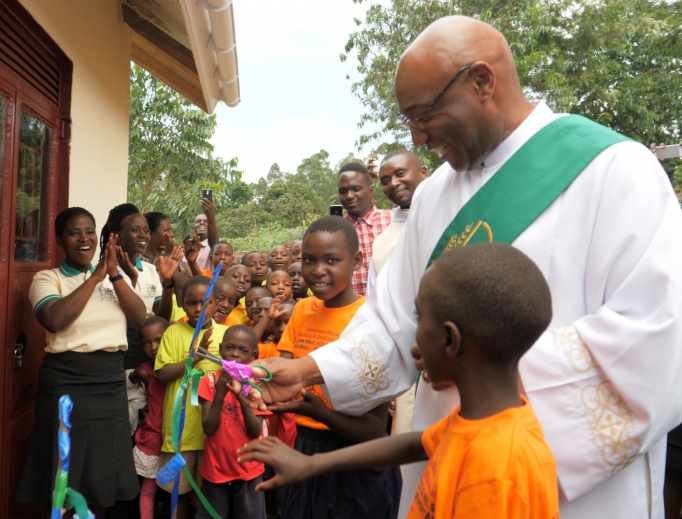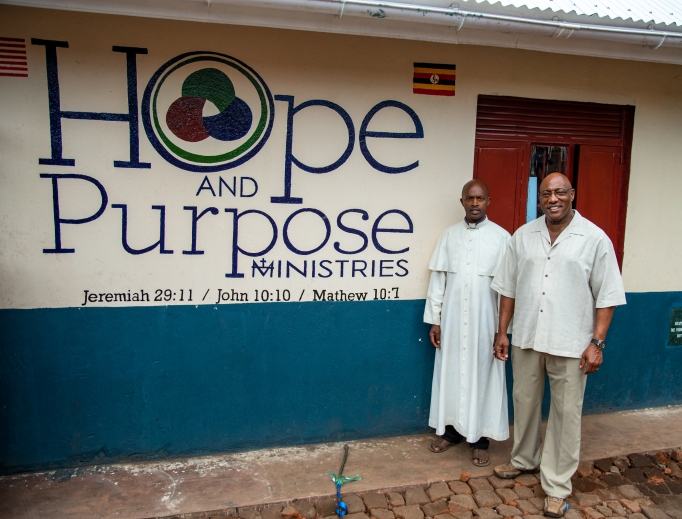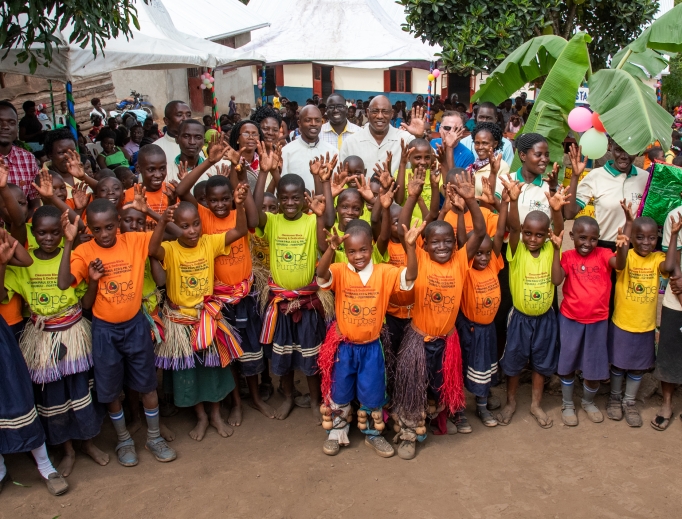Building Hope and Providing Purpose in Uganda Through School Named for a Saint
New institution built by American deacon’s ministry offers promise to African children.

When Deacon Larry Oney, founder and president of Hope and Purpose Ministries, responded to a call to evangelize in East Africa seven years ago, the New Orleans permanent deacon realized God wanted him to be the Good News before preaching it, by first ministering to the people’s basic needs.
One fruit of this call has been the St. John Paul Primary School, a coed Catholic grammar school Deacon Oney’s organization has helped build in a very poor Ugandan village where children now learn the faith and prepare for a better future — an initiative the he hopes that his Louisiana-based missionary outreach can replicate in other African locations.
“God is reshaping our ministry and saying … that’s great that you want to preach the Gospel,” Deacon Oney told the Register, “but you have to be the Gospel before you can preach the Gospel. We’re just doing what’s before us.”
St. John Paul’s, also called the Fort Portal school, was dedicated last July and is the result of a partnership between Hope and Purpose Ministries and a Ugandan priest named Father Sylvanus Mushabe. Some of its 740 students in grades 1-7 face hunger, HIV and threat of kidnapping, but all are finding new hope as they learn not only academics and the Catholic faith, but entrepreneurial skills and sustainable gardening.



As the first Hope and Purpose Ministries school grows, Deacon Oney plans more improvements to address children’s needs. He hopes U.S. Catholics will support the initiative financially and come to the African continent to serve and experience the culture.
Deacon Oney arrived in Uganda’s capital, Kampala, about six years ago, at the encouragement of Ugandans he’d met in New Orleans. He planned to preach the Gospel and founded Hope and Purpose Ministries as a way to do so — in both word and deed. The ministry seeks to participate in the New Evangelization through preaching, teaching, leading retreats, conducting parish missions, and fostering the baptism of the Holy Spirit. It has led missions in Canada, Europe, Brazil and the Caribbean.
Into Africa
Upon his arrival in Africa in 2013, Deacon Oney found the Ugandan people gracious, but he was saddened when he saw widespread hunger, a lack of hope, the need for education and skills, a refugee crisis and many suffering from HIV/AIDS.
“We want to expand the Kingdom of God; we want to heal the brokenhearted, to give people a sense of hope and purpose for their lives,” he said. “All you have to do is step foot on the continent of Africa, and you can see the lack of hope, the lack of purpose there, so it was natural, the need is everywhere. … Sometimes it’s very difficult for people to hear the Gospel if there is the roar of hunger pains from their belly.”
And hunger is not the only concern.
The Ugandan population is young, with the median age just under 16. Unemployment is nearly 50%. East Africa, where Uganda is located, is Africa’s poorest region, Deacon Oney said, adding that approximately 50% of Ugandans are Catholic, though evangelical Protestants are making inroads.
During trips he takes to Uganda every four to six months, Deacon Oney also has made significant inroads, including leading a retreat for the Ugandan parliament, organizing a group of intercessors who pray for Deacon Oney’s ministry, and last year holding a retreat for priests from different countries in the region.
Father Mushabe, whom he met during his travels, told him about the difficulties experienced by the children of the village of Kidubuli, located outside the town of Fort Portal, about 185 miles west of Kampala. Father Mushabe, now the school’s proprietor, served the Catholic population in the area for five years.
“This is part of my life from the beginning,” Father Mushabe said of the children’s situation. “I personally went through a hard time to get my education and my studies to go to school.”
Good News, Hard Journey
Although Deacon Oney had been in Uganda already for four years, only in 2017 did he make the six-hour trip from Kampala to Fort Portal and Kidubuli, an especially arduous journey because of bad roads. That first trip has taught him, too, that each time he travels there, he must carry in his own food and water.
Deacon Oney agreed to help Father Mushabe raise funds for the school, as one of Hope and Purpose’s international outreach initiatives, because of its potential to serve the future of the Church and raise up young people who are fully Catholic.
“It makes so much sense,” Deacon Oney said. “How we can give hope with a sense of purpose without education?”
In taking on the building of St. John Paul’s, Hope and Purpose Ministries has funded construction of six school buildings with latrines, rainwater receptacles and two kitchens with stoves that offer the children a daily meal.
One building is a rest area for children with HIV or other special needs. Roughly 25% of the schoolchildren have HIV, Deacon Oney said. “The need is so great it can be overwhelming, so we just decided to do what we can do.”
Along with the Catholic faith, academics, music and sports, students at the school are learning to make rosaries and necklaces they can sell, Father Mushabe said.
Not Just Business
Todd Villarrubia, a New Orleans tax attorney, accompanied Deacon Oney from New Orleans to Uganda last year, where he taught business-related skills to a group in Kampala and visited the Fort Portal school.
“It’s not just that we’re educating [the children] — we’re actually teaching them about business and profit,” Villarrubia told the Register..
The students are learning sustainable-gardening techniques as they grow food for school meals, Deacon Oney added. “If we can grow the food, let the older children participate in the cultivation of the food and teach them agriculture now, you start to sustain the school for itself.”
Some of the schoolchildren have planted similar gardens at home, Father Mushabe said.
Hope and Purpose Ministries is negotiating with the local diocese so that the organization can gain ownership of the school to better provide financial support, Deacon Oney said, adding that he hopes to add a high school within three years.
Other plans include drilling a well and building a fence to protect the children and gardens from wild animals — and worse. Members of terror groups such as Boko Haram have recruited Ugandan children to fight by offering them food and drugs, he said. To counteract such allurements, the school has made providing food for the children among its main priorities.
Father Mushabe also hopes to add a boarding facility, especially for students who are orphans. The students “will be able to build a community with a difference where they will have passion to support people who are in need,” he said. Already he said he’s noticed that the children seem more hopeful.
Model Education
Deacon Oney is also hopeful. He sees the Fort Portal school as a potential model for other Hope and Purpose Ministries schools the ministry wants to build near Kampala as well as in Kenya and Tanzania.
As the school benefits the children and their families, it’s also a magnet that Deacon Oney said he hopes will attract Americans to Uganda: to visit, devote time to teach or serve in other ways. He encouraged Catholics to invest financially and spiritually in the Fort Portal school and the other projects that Hope and Purpose Ministries is undertaking in Africa.
“We can take a very, very small amount and make a great impact on the continent of Africa,” Deacon Oney said. “I would say, “Reach out beyond yourself, see the faces of these children and see what the future might be!’”
Deacon Oney added that the mission’s purpose is rooted in serving in Christ’s name: “It’s an opportunity for us to be Christ to them and build a platform where Catholic values and Catholic teaching are taught.”
The teachers at St. John Paul’s also, naturally, support these efforts.
One teacher, Docusm, said the school has inspired and helped her to open up a bank account and earn money in the form of a salary. St. John Paul’s hasn’t only given her a way to live out her vocation as a teacher — helping her students become better learners — but it has also helped her improve her standard of living, save money and plan for the future. In short, through the work of Hope and Purpose Ministries, she has found hope and purpose in her life. Docusm said that she is also able to associate better with teachers and parents from other cultures and religions.
Another teacher who has taught for three years, Sarah, says she has learned leadership skills, teaching experience and is more understanding of the situations students face in their lives. She says her faith has increased as she has seen the school grow from a small to a large student body and from temporary to permanent building structures. She says she appreciates the American people who donated all of the buildings and is thankful for Deacon Oney and other future donors.
For his part, Villarrubia said he plans to return to Uganda. “I know how education can really change the arc of a person’s future,” he said. “To think that in some small way we’re able to contribute to generations of kids that will come through that school, it feels good to be a part of it.”
Register correspondent Susan Klemond writes from St. Paul, Minnesota.
- Keywords:
- africa
- catholic education
- susan klemond
- uganda
















